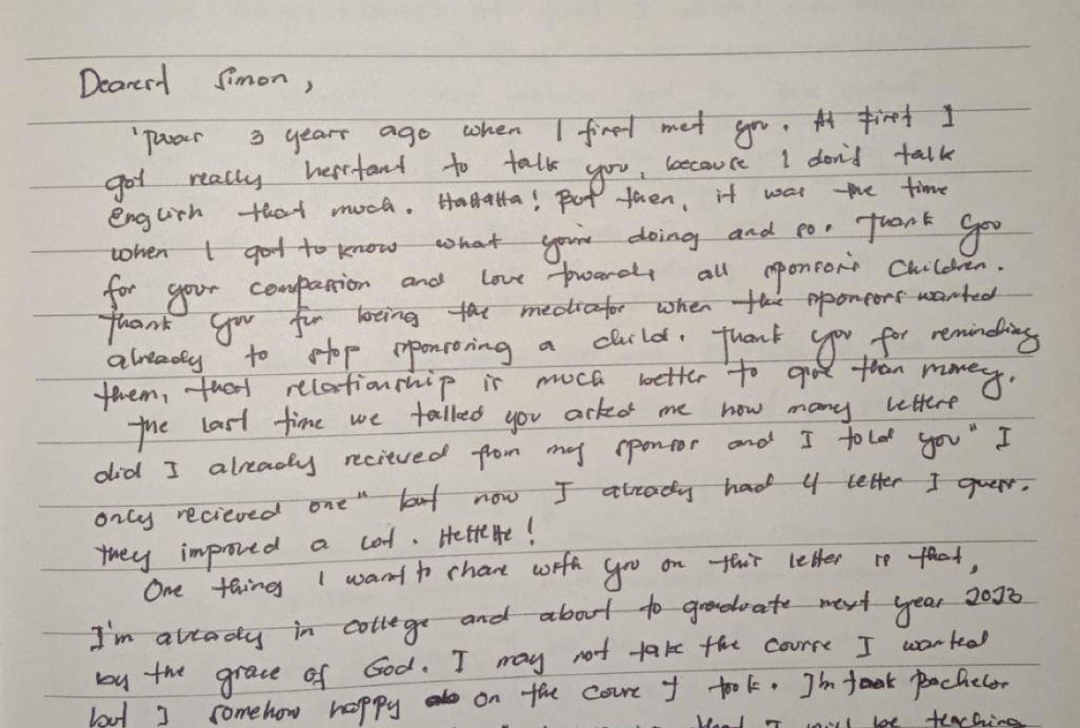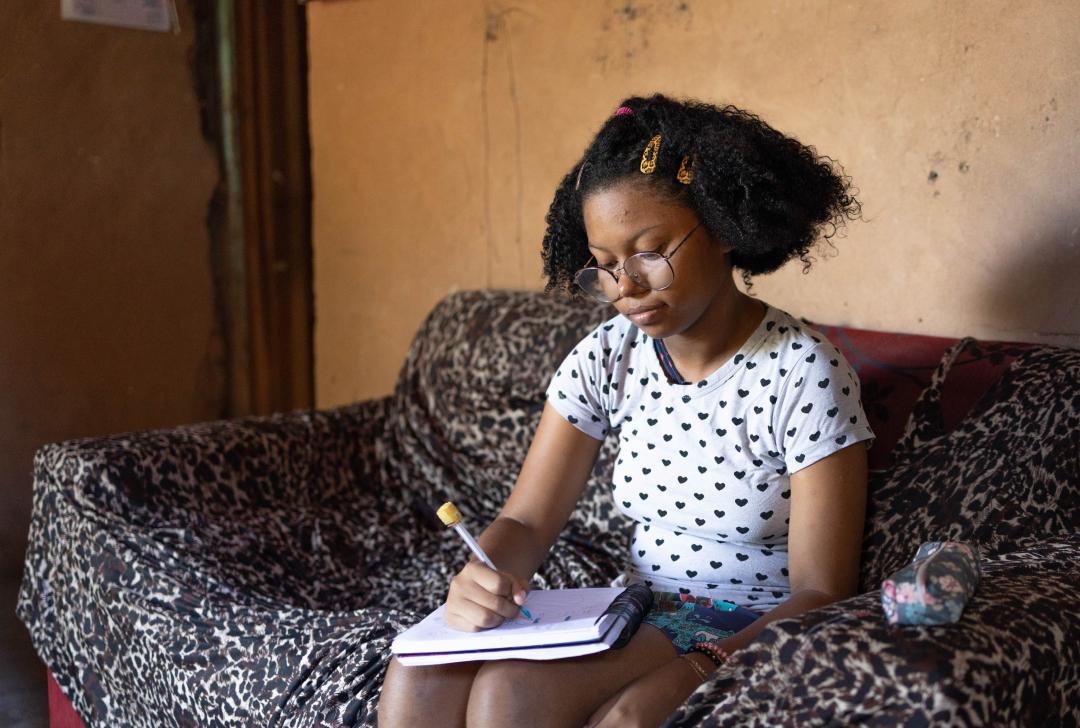We naturally tell stories when we write letters. It’s a way we connect as human beings, but it can also be a way to release your sponsored child from relational poverty.
22 Apr, 2024
Social isolation is a battle faced by millions around the world. According to a Gallup study conducted at the end of 2023, almost a quarter of the world feels lonely.
That’s a big number.
Living in an age of digital connection means that we might know a lot of people, but we don’t really know them. It’s a disease that affects people of all ages—and it’s a growing concern in our world.
But how can we combat it?
Simon has been working as a Partnership Manager for Compassion Australia for several years. Before this, he was a church pastor in Queensland, shepherding a community that had a strong relationship with Compassion.
“I think many people in western countries think that the main answer to poverty is money,” says Simon. “We don’t understand the importance and necessity of building relationship.”
One of the children that Simon has personally sponsored for many years is a young woman called Lee May who lives in the Philippines. In one of her letters, she wrote, “Thank you for reminding me that relationship is much better to give than money.”
Simon says that it was this sentence that made him realise how important letters truly are, and he wants to continuing advocating for this message.

Abject poverty is the highest form of poverty one can face. It means that someone cannot access even the most basic of needs and it comes with extreme feelings of misery and humiliation.
For too many of our global neighbours, this is their reality. But one of the deeper issues of abject poverty is the isolation that can lead to relational poverty.
Relational poverty is part of the loneliness epidemic. It refers to being poor in community or lacking a dependable support system. It happens when there’s an absence of meaningful connection and affects people from every corner of the world. This form of poverty cuts especially deep because it touches the heart.
One of the ways Compassion seeks to release children from relational poverty is through letter writing.
At first glance, this might not sound like everyone’s cup of tea. Recent research from Compassion found that only two in five Australian sponsors have written to their sponsored children in the past year.
It’s true that in the western world many of us lead busy lives, and have valid reasons and pressures that chew up our time. But these simple letters matter more than we realise.
Mariana, a 15-year-old girl from a village in northeast Brazil, writes beautiful letters to her sponsor filled with vibrant stories about her daily life, family and dreams.
Naturally gifted with a pen, Mariana is generous with the words she shares and the stories she tells. Let’s face it: it can be hard to write to a person you’ve never met! But Mariana’s passion would inspire anyone to write back.

Here’s an excerpt of one of Mariana’s recent letters:
Dear Sponsor,
How are you doing? Thank you for your last letter!
It was so nice to see the pictures you sent me last time. It’s interesting that you have snow where you live, even at the beach! Here, everything is so different. Cacimbão, my village, is so hot especially in summer.
I’m enjoying the last days of my school holidays. My cousins came from another city to spend their vacation with us. It’s so cool to have them here so we can play together. We love running and playing football. Well, lately I’m not enjoying playing football because my friends hit the ball on my head and I don’t play very well, but I would love to enjoy it more.
I grew up watching my aunties and mother making bilro lace, and eventually I also learned it. All the women in our family are lacemakers. My mother spends hours and hours making clothes and towels to help our family income. I also try to help my family with the household activities, like collecting vegetables from the garden. My mother asks me to feed our animals, but I don’t like it because sometimes our goose chases me.
One of my favourite moments of the week is going to the Compassion centre. There we play freely, study, learn new things and eat delicious food. I would love to go there every day.
Without the centre my life would be so boring, and I would be so different. When I was younger, I used to be very impatient and fight with everyone. But now God is changing my heart. I’m getting closer to God, day by day, and He’s the one who gives me hope to dream for a better future.
The volunteers from the centre always care about us. When we need food, they provide us food baskets, and when they receive donations like watermelon, vegetables or bread, they always bring the food to us and distribute it to the community.
Watermelon is my favourite fruit, so I was really excited when they came with baskets of watermelon last time!
Because of the centre, I also have you. Thank you for everything you are doing for me! Thank you for supporting me with your prayers, letters and encouraging words. I’m excited to read your next letter!
With love,
Mariana

Pretty beautiful, isn’t it?
Next time you go to write a letter to your sponsored child, think about the joy that will bubble up within them as they sit down to read your words. You may even find that sharing little stories of your day-to-day life is a helpful reflection exercise for you, too!
One of the ways Compassion has tried to speed up the process of sending letters is through your online My Account profile. Within five minutes, you can type out a letter, attach a photo and send it on it's way.
If you don’t know what to write about, we even have some prompts to get you started. Writing a letter is an act of love, demonstrating care for your neighbour above yourself and it can mean more than you know.
This week, why don’t you make a relational connection with your sponsored child? Grab a cup of tea or coffee, a quiet spot and start writing. You never know how much your words will mean to your neighbour on the other side of the world.
“I really like the holistic approach Compassion takes to tackling poverty. There is value placed on the physical, socio-emotional and spiritual wellbeing of the children, as well as providing them with an education. All of these things are important together,” says Simon.
Together, let’s stand against the loneliness epidemic by sharing our stories and uniting as a global neighbourhood.
Written by Sarah Moore, Compassion Australia

